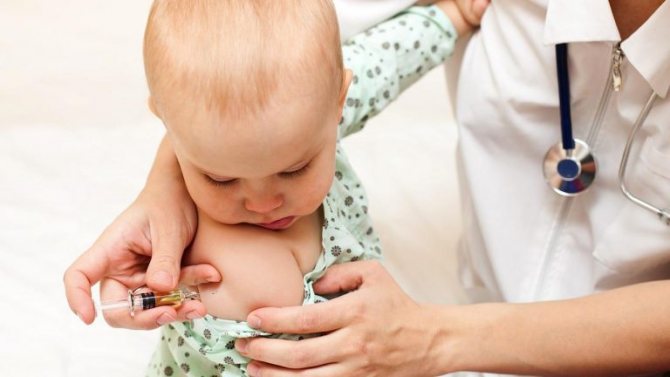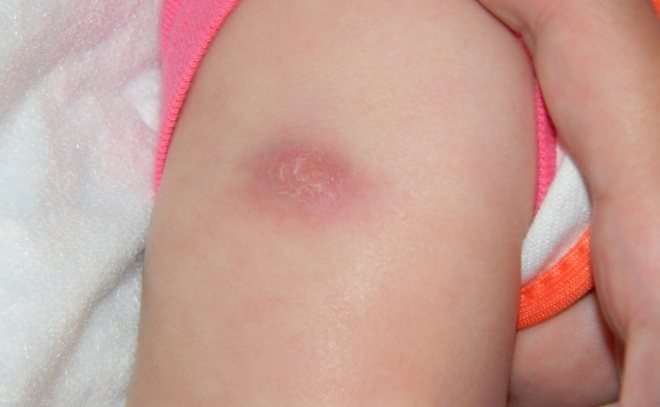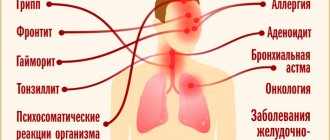Diphtheria vaccination, vaccination methods and types of drugs
Timely vaccination provides protection against the disease caused by the pathogen Corynebacterium diphtheriae, or rather, the toxins secreted by this microorganism. The disease is characterized by the formation of dense films on the mucous membrane of the pharynx, nose, larynx, trachea and the appearance of signs of general intoxication.
Since it is impossible to obtain stable immunity after diphtheria is cured, every person, regardless of age, should be vaccinated. The introduction of a vaccine preparation promotes the formation of antitoxic immunity, which helps to avoid the development of dangerous forms of pathology that result in disability or death of the patient.
To immunize the population, a vaccine is produced, which is a weakened diphtheria toxin. Its administration provokes the synthesis of antitoxins. Their presence causes immunity to the effects of corynebacteria (diphtheria bacilli).
Modern medicine uses 2 types of vaccines:
- With preservative (thiomersal, merthiolate). This is a substance containing mercury. This compound also has antiseptic and antifungal properties. Its concentration in the vaccine is so low that it cannot have any harmful effect on the body as a whole. Vaccines with merthiolate are produced in ampoules designed for several doses. The list of drugs with thiomersal is presented by the vaccines DPT, ADS-M, ADS, Bubo-Kok, Bubo-M, D.T.Vax.
- Without merthiolate. Such compositions are safer and are dispensed into syringes for single use. Among the vaccines without a preservative, it is worth highlighting Pentaxim, Infanrix, Infanrix Hexa, Tetraxim.
Diphtheria vaccination: principle of action and effectiveness of the vaccine, contraindications, side effects
Today, vaccination against diphtheria has become a mandatory measure in the vaccination schedule for children and adults, which has reduced the incidence of this disease by more than 90%.
The need for vaccination is difficult to overestimate, given the mortality rates, which before the 1970s. — before the start of the mass vaccination program — reached 70%.
Contents of the article: Diphtheria: what is it? Types of vaccines and principle of action Diphtheria vaccination for adults and children Contraindications for vaccination List of possible side effects What is the result of vaccination?
What is diphtheria?
Diphtheria is a disease caused by the diphtheria bacillus - Loeffler's bacillus, which is transmitted from a sick person to a healthy person by airborne droplets, food (through products) and household routes (through common household items, dishes, etc.). But the greatest danger is not the bacillus itself, but its toxins - substances produced during the life of the pathogen. These toxins affect body tissues, causing disruption of the cardiovascular, nervous and other systems.
This disease is especially dangerous for children, in whom diphtheria causes severe complications, often incompatible with life. The most dangerous form of diphtheria - hypertoxic - develops very rapidly: just a few hours after the onset of the first symptoms, body temperature rises to 40 ° C and above, severe swelling of the oropharynx is observed, and on days 2-3 critical respiratory and heart failure develops, leading to death.
Attention! An effective and natural remedy for COUGH, FLU and ARVI exists! Follow the link and find out how you can get rid of these problems and finally strengthen your immune system! Read more >>>
How the vaccine works
Unlike many other vaccines, the diphtheria vaccine does not contain live pathogens, but a specially processed toxin from the diphtheria bacillus. It is this extremely toxic substance that poses the greatest danger to human health and life. To acquire resistance to diphtheria, the immune system only needs to “get acquainted” with these toxins, after which it begins to produce antitoxins - substances that keep the body in constant “readiness” and provide it with immunity to the pathogen.
The duration of action of the vaccine is about 10 years, after which the body loses immunity and a repeated single vaccination is necessary to restore immunity to the diphtheria bacillus.
Types of Diphtheria Vaccines
There are two types of diphtheria vaccines in use today:
Tired of going to doctors? Write down a folk recipe...
To prevent colds, coughs, flu, sore throat and problems with runny nose and ears from bothering you, before going to bed you just need...
Read more >>>
- A vaccine containing diphtheria toxoids and a preservative is available in ampoules containing several doses that are used for several patients. Such vaccines with thiomersal (a preservative) have a longer shelf life, but can cause more side effects.
- The vaccine, without preservatives, is dispensed into disposable syringes or tube syringes that contain only one dose (0.5 ml). The syringe is used for one patient and is discarded after use. In modern medical practice, an isolated vaccine against diphtheria is practically not used - diphtheria toxoid is administered in the form of a complex preparation ADS or DPT (diphtheria + tetanus toxoids and pertussis toxoids + diphtheria + tetanus, respectively).
Diphtheria vaccination for children
The first diphtheria vaccination is prescribed to a child at three months of age, after which it is necessary to repeat the administration of the toxoid twice more, with an interval of 30-40 days between each procedure. This three-time immunization is considered complete - the probability of infection with diphtheria bacillus is no more than 92%. To increase the body's resistance, so-called booster doses are prescribed - additional intermediate vaccinations.
As a rule, booster doses are administered 1 year after the full course of vaccination and then at the age of 6-7 years. Thus, the diphtheria vaccination schedule for children is as follows: I vaccination – 3 months; II vaccination – 4.5 months; III vaccination – 6 months; IV vaccination – 1.5 years;
V vaccination - 6-7 years.
Diphtheria vaccination for adults
In addition to scheduled vaccinations, which are carried out every 10 years and can be postponed to a later date or not performed at all (if a person refuses vaccination), some groups of the adult population must undergo this procedure without fail:
- employees of preschool and school children's institutions;
- catering workers;
- medical workers.
Diphtheria vaccination: contraindications
There is only one absolute contraindication for diphtheria vaccination (a factor that makes the vaccine strictly prohibited under any circumstances). This is an allergic reaction to any component of the vaccine (toxoid, preservative, solvent, etc.).
Therefore, if a person planning to get vaccinated against diphtheria for the first time has a pronounced tendency to allergies of any type, it is necessary to consult with an allergist or immunologist before vaccination. This will prevent possible health complications.
But diphtheria vaccination has a number of conditional contraindications that require rescheduling the scheduled vaccination to a later date:
- acute viral disease suffered less than one month ago;
- increased body temperature;
- pre- and postoperative period, as well as other conditions accompanied by a weakened immune system;
- dermatitis, eczema and other skin diseases in the acute period;
- pregnancy up to 12 weeks.
The last point needs more detailed explanation. Pregnancy itself is not a contraindication, and even vice versa: if a woman has not completed the full cycle of immunization before pregnancy, then vaccination is considered a procedure necessary to protect both the expectant mother and the child in the first three months after birth. Three-time administration of the vaccine (mainly ADS) according to the approved schedule is carried out after the 12th week of pregnancy, when the most “vulnerable” period for the fetus has ended.
Vaccination of pregnant women does not pose a threat to the health of the child and does not pose any danger regarding premature termination of pregnancy.
Diphtheria vaccine: side effects
All side effects after vaccination relate to the body’s natural reactions to the administration of toxoid. This means that such reactions are predictable, harmless and go away on their own without any special treatment. The most common conditions following vaccination are:
- increase in body temperature to 37.3-37.7 ° C in the first 2-3 days after vaccination;
- pain, tenderness, or swelling at the site where the vaccine was administered;
- slight discomfort in the first few days;
- increased sweating. When body temperature rises, it is recommended to take conventional antipyretics - aspirin, paracetamol, etc., and if there is severe pain at the injection site, you can use stronger non-steroidal anti-inflammatory drugs, which will help both lower the temperature to normal and relieve pain. Among the recommended ones are Nimesulide, Ibuprofen and others.
Vaccination effectiveness
After a full vaccination cycle, there is still a possibility of infection: the diphtheria vaccination does not provide a 100% guarantee of immunity to the bacillus. But in a vaccinated person, the disease is mild and does not pose a threat to health or life.
Important!
Do you want to lose excess weight by summer and feel light in your body? Especially for readers of our site, a 50% discount on a new and highly effective weight loss product that...
Read more >>>
Need an ENT doctor? Select it for free:
Please note: all materials on the site are published for informational purposes only and cannot be regarded as medical advice. Before using information from articles read on the site, be sure to consult your doctor!
Similar articles:
xn--c1aqgcbbkm.xn--p1ai
Vaccination whooping cough tetanus diphtheria, vaccine name and characteristics
Immunization is mainly carried out using DTP vaccination, the full name of the vaccine is adsorbed pertussis-diphtheria-tetanus vaccine.
It contains:
- non-living pertussis germs,
- diphtheria toxoid,
- Tetanus toxoid.
The vaccine can be cellular or acellular. The first option is preparations with whole cells of a killed pathogen (DTP), the second type of vaccines contains particles of non-living pathogenic microorganisms (Pentaxim, Infanrix).
The first vaccines cause more adverse reactions, such as fever, headache, redness and swelling at the injection site.
Russia produces the DTP vaccine.
Immunization can also be carried out using foreign vaccines:
- Pentaxima. From the name of the vaccine it is clear that the number of components is five. It protects not only from the pathologies listed above, but also from two more diseases - polio and hemophilus influenzae infection. The French drug is well tolerated by children and is administered to babies from 2 months of age.
- Infanrixa. Belgian vaccine with the presence of 3 main components, as in the Russian DTP. Indications: primary immunization and revaccination. Vaccination is allowed from 2 months.
- Infanrixa Hexa. Helps protect against both the main three pathologies and hepatitis B, Haemophilus influenzae and polio.
- Tetracocca. The French-made drug is intended for the prevention of 3 major diseases and polio. Administered from 2 months to 6 years of age. By completing a course of 4 vaccinations, almost 100% protection against the listed ailments is achieved.
Vaccination calendar, at what age, at what age is vaccination against diphtheria recommended
It is difficult to underestimate the importance of using the DTP vaccine, because before its invention, diphtheria, whooping cough and tetanus were the most common causes of death in children. Therefore, you should listen to the instructions of doctors and not refuse vaccination. And for this you need to know at what age vaccinations are given.
Vaccination calendar:
- from 3, 4.5, 6 months of age,
- 1.5 years
- 6-7 years old
- 14 years old.
As for adults, immunization is carried out taking into account whether the diphtheria vaccine was previously given. If a person has been administered the drug, the vaccine is used every 10 years to maintain immunity, starting at age 24.
18 months, first revaccination
Since after a course of vaccination a year later the production of antibodies may cease, it is planned to re-administer the drug to children who are 1.5 years old.
Parents who are unaware of the possible risk refuse revaccination, especially after negative reactions to the administered substance occur. You can make sure that the baby is completely protected only with the help of an immunological study.
Repeated vaccination at 7 years of age
The second revaccination (diphtheria-tetanus vaccination) should be carried out at 7 years of age, using drugs containing only tetanus and diphtheria toxoids.
Revaccination at 14 years of age
How important is diphtheria vaccination at 14 years old? Adolescents at the age of 14 are vaccinated with the ADS-M vaccine, in which active toxoids are present in small quantities. This is explained by the fact that there is no need to create immunity. It just needs to be supported.
Frequency of revaccination
After a series of primary immunizations, the overall period of protection against diphtheria is approximately 10 years . Not all people know that revaccination with ADS-M is also recommended for adults every 10th birthday, starting from the last vaccination given at 14-16 years of age.
But if a person does not remember the last time he was vaccinated, then he is prescribed a double injection of ADS-M (with an interval of 1.5 months) and a single revaccination after 6 or 9 months. All information about the necessary vaccinations is contained in a special medical book.
They are compiled and maintained by the local clinic service. More recently, diphtheria vaccination has been recommended for people over 66 years of age. But now, as average life expectancy has increased, booster vaccinations against diphtheria have lost their maximum age.
Where is the injection given and how to prepare for the procedure
If a child is scheduled to undergo a routine vaccination, parents should know where the injection is given, why the drug should be administered in a certain place, and how to prepare.
DPT vaccination is done by a qualified health worker in compliance with all rules. For children, intramuscular administration is provided in the thigh area.
An injection in this place guarantees the most effective result, but the reaction will be mild. This is possible due to the presence of a minimal layer of subcutaneous tissue in the selected areas, which facilitates normal absorption of the drug.
Adults receive injections in:
- subscapular region,
- anterior outer thigh area.
Doctors constantly remind people of the importance of preparing for the procedure, since complications after vaccination are possible.
To minimize the risk, you must adhere to a number of conditions:
- The vaccine is given to a healthy child,
- the best time for vaccination is an hour after eating,
- Before the procedure, it is recommended to visit the toilet,
- you should stock up on antipyretics,
- On the day the injection is given, you must refrain from walking and swimming.
Possible complications after DTP vaccination
Any vaccine, including DTP, can sometimes provoke complications resulting from a reaction to the components of the drug.
Statistics show that in America since 1978, not a single case of severe consequences of the administration of vaccines against whooping cough, tetanus and diphtheria has been recorded. Among the possible complications, which occur extremely rarely, doctors identify neurological manifestations that are presumably caused by reactions to the pertussis antigen.
This means the occurrence of:
- seizures without an increase in temperature (per 100 thousand vaccinated people there can be from 0.3 to 90 cases),
- encephalopathy (less than 1 case per 300 thousand vaccinated).
At the moment, convulsive phenomena that are not accompanied by an increase in temperature are not considered a complication.
The risk of severe consequences increases greatly if absolute contraindications are ignored. In addition to the listed violations, the occurrence of:
- infectious-toxic shock,
- serious allergic reaction.
Typically, the appearance of such complications is observed almost immediately after vaccination.
Types of vaccines
The vaccines currently used for vaccination against diphtheria are divided into two groups:
- With preservative thimerosal. The drug is highly allergenic. Contains mercury.
- No preservative. Has a short shelf life but causes fewer side effects. Considered safer.
Any type of vaccine must be stored and transported under strictly defined conditions. It cannot be frozen, and the temperature must be constantly maintained within the range of +2 – +4˚С. If storage conditions are violated, the vaccine cannot be used.
Currently, the anti-diphtheria vaccine is not used in an isolated version in Russia. It is usually administered in combination with others. It could be:
- ADS – vaccination against tetanus and diphtheria. Indicated for both children and adults.
- DTP - this abbreviation means a diphtheria vaccine, supplemented with components against tetanus and whooping cough. Usually used for children under 4 years of age.
- Tetrakok is a vaccine against four diseases at once. To the three components of DPT, a polio component is added. To create complete protection against all four infections, a comprehensive vaccination carried out in four stages is required.

Consequences of using DTP and possible reactions, leg pain, fever
Don't panic when your leg hurts after an injection. According to doctors, no special treatment is required in this case. The symptom disappears on its own within 7 days. If the pain bothers you too much, you can use non-steroidal anti-inflammatory drugs (Ibuprofen, Nimesulide).
In addition to painful sensations, the following consequences and reactions may occur when vaccinated with diphtheria tetanus in the form of:
- swelling of the injection site caused by local inflammation,
- compactions (this is a consequence of the composition getting into the subcutaneous tissue and resolves in about a month),
- temperature (it is allowed to take antipyretics).
You should be careful: an increase in temperature 2 days after the procedure indicates the beginning of the development of a completely different pathology, and vaccination has nothing to do with its appearance.
Sometimes parents, after vaccinating their child, encounter:
- febrile seizures,
- a child's shrill cry,
- bowel disorder,
- itching,
- increased sweating,
- coughing attacks,
- headache,
- dermatitis,
- runny nose,
- sleep disorders,
- loss of appetite.
These side effects should not be cause for alarm. They are quite easy to treat.
What reactions and side effects may occur
Complex vaccinations are accompanied by various side effects and effects, which can occur to varying degrees in different people, depending on the age and reactivity of their body.
Local reactions
The main local reaction is redness in the injection area. At first, the injection site from the vaccine hurts. The pain disappears by the end of the first day after the manipulation and turns into itching. A small bump is a normal reaction of the body, it is caused by excipients contained in the vaccine that irritate the subcutaneous tissue.

General reactions
The general reaction to the administration of the drug is characterized by an increase in body temperature to subfebrile values. The shoulder blade hurts slightly. You feel a slight chill, accompanied by weakness and drowsiness. Possible headache and nausea. In young children - vomiting or unstable stool, even diarrhea. Usually, the malaise lasts for 1-3 days after vaccination and goes away without a trace without treatment.
Adverse reactions
Most adverse reactions are associated with individual intolerance to the vaccine. Most often, this is due to preservatives that are used to preserve the activity of the toxins. A reaction to diphtheria vaccinations in adults, which is not common but may occur, is:
- cough;
- runny nose;
- dermatitis;
- otitis;
- pharyngitis or bronchitis;
- my back hurts.
Complications and consequences
Diphtheria vaccinations are considered safe. There have not been any cases of severe allergies in the form of anaphylactic shock or death due to the administration of the vaccine. Children who are prone to allergies to food, pollen or animal dander have a hard time enduring vaccinations. People suffering from dermatitis may experience worsening of their skin after vaccination.
Is the body completely protected after vaccination?
No doctor can give a complete guarantee that after a preventive vaccination a person will not get sick. Even those who have had diphtheria carry the risk of reinfection up to 10 years after the illness. Although it is believed that the immunity developed during illness is more durable than after vaccination. In developed countries where regular vaccination against diphtheria is organized, the protective properties increase as the volume of vaccine administered increases. The older a person is regularly immunized, the lower their risk of getting the disease. According to WHO, the effectiveness of diphtheria vaccinations is 98%.
Contraindications to DPT, absolute and relative
Before agreeing to vaccination, you should make sure there are no contraindications. This is especially true for young children. Parents should find out when vaccination can be done and in what cases it is prohibited.
There are contraindications:
- absolute,
- relative.
The first include the presence of:
- history of afebrile seizures,
- progressive diseases of the central nervous system,
- severe reactions to previous DTP vaccination: temperature above 40C in the first 2 days after vaccination, swelling or redness at the injection site more than 8 cm.
When the listed conditions are present, DTP will not be administered at all. If one of the absolute contraindications is ignored, the patient faces a serious complication.
If there are relative contraindications, vaccination is postponed for a certain period.
The vaccine is given later to those who suffer from:
- acute diseases,
- exacerbated chronic diseases.
Vaccination of pregnant women, schedule of vaccinations when carrying a child
If a woman becomes pregnant, live vaccines should not be used, otherwise the baby may suffer from infection. The drugs used for immunization against diphtheria contain only toxoid.
The World Health Organization allows the use of diphtheria and tetanus vaccines during pregnancy. If the last vaccination was given 10 years ago or more, a pregnant woman may well be immunized.
In the event that the course has not previously been completely completed, a schedule is drawn up that provides for 3-fold administration of vaccine preparations. This will help ensure that the baby has antibodies during the first months of life.
However, the possible risks of using vaccines during pregnancy should be taken into account. It is advisable to refrain from immunization until 12 weeks. When the 13th week approaches, the vaccine does not pose a threat to the baby.
Pregnant women must be vaccinated if an epidemic is developing in the region where they live.
Ideally, prophylaxis should be carried out before pregnancy to minimize the risk of harm to the developing fetus.











